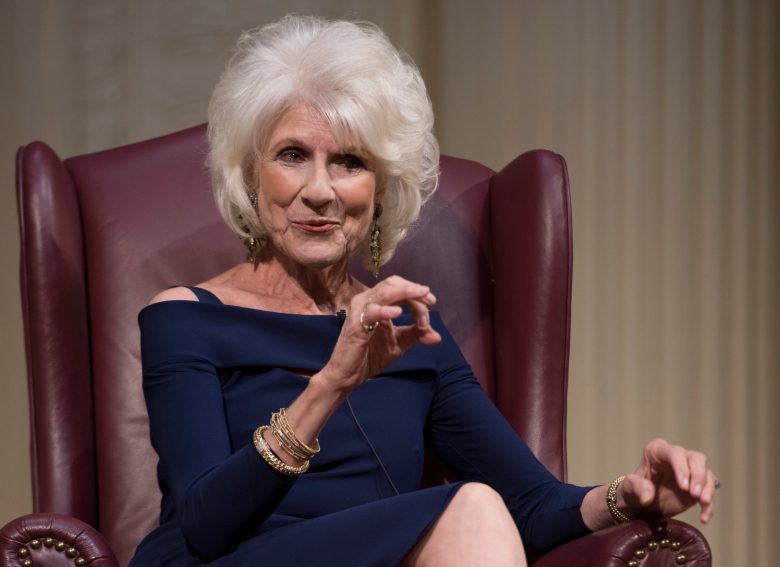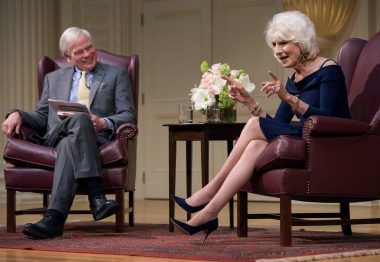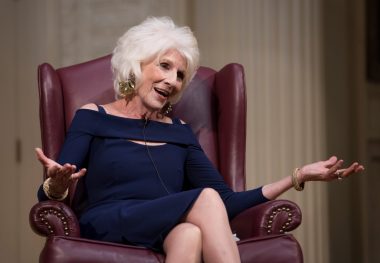The 2017 James P. Elder Lecture on April 6 featured "An Evening with Diane Rehm," with D.G. Martin of UNC-TV's Bookwatch program interviewing the longtime host of one of the most interesting NPR talk shows in the country.

Growing up in a household with parents who had immigrated to the United States from the Middle East, Diane Rehm said she was discouraged from asking questions. Young women weren’t expected to pursue a degree in higher education, and questioning the reasoning behind decisions was frowned upon, she said.
But that did little to discourge the thirst for knowledge within the young Rehm, who would go on to become one of the country’s most well-known and beloved talk show hosts and interviewers, and who offered a look inside her life and career at Elon University Thursday night at the James P. Elder Lecture.
“I think that the listening skill is the greatest skill that we as human beings can have, and the way one listens is to ask questions,” Rehm told the crowd that filled Whitley Auditorium for the April 6 event.
 Rehm recently concluded a 37-year stretch as host of “The Diane Rehm Show,” a National Public Radio staple produced by WAMU, the NPR station at American University, that attracted guests of national and international prominence as well as a steady following. Rehm is the author of four books, including “On My Own,” a memoir published last year that chronicles the death of her husband, John, and her efforts to rebuild her life without him.
Rehm recently concluded a 37-year stretch as host of “The Diane Rehm Show,” a National Public Radio staple produced by WAMU, the NPR station at American University, that attracted guests of national and international prominence as well as a steady following. Rehm is the author of four books, including “On My Own,” a memoir published last year that chronicles the death of her husband, John, and her efforts to rebuild her life without him.
That experience with the 2014 death of her husband, who suffered from Parkinson’s disease, caused her to become an outspoke advocate for what she calls “death with dignity.” Rehm told the audience that her husband was adamant that he was ready to die, but had no options beyond refusing food, water and medication. There was no path that would have provided him assistance from the medical community in ending his life, she said.
“John and I had talked about this so much, throughout our marriage,” Rehm said. “It was the whole idea of being ready when the time came, not to do something as harsh as to commit suicide, but rather to be ready to relinquish life and to move on to what we both believe is the next journey. … It is the circle of life, and I believe the choice should be there for us.”
Rehm shared the stage Thursday night with D.G. Martin, host of UNC-TV’s Bookwatch, who put Rehm in the position of being the interviewee rather than the interview. In her conversation with Martin, Rehm shared about her early life growing up in Washington D.C., where she was an eager and curious student who after completing high school became a secretary, eventually moving to the Department of State, where she met her husband.
John Rehm, then a general counsel in the State Department, was drawn to her by the stack of books on her desk that included “The Brothers Karamazov” by Fyodor Dostoyevsky and “Of Human Bondage” by W. Somerset Maugham. “He stopped and wondered why a secretary would be reading those books,” Rehm said. “I wanted to know what other people knew. I wanted to read what educated people read.”
Rehm and her husband used each other to satisfy their personal and intellectual curiosities, and developed a relationship that would serve Rehm well as she eventually moved behind the microphone as a radio show host. “My ability to ask John questions, and his ability to want to know me better, created this wonderful relationship,” Rehm said.
Rehm’s first stint as a radio show host in the mid-1970s began almost by accident after she arrived at a local station to volunteer and as asked to help fill in for a sick host. “For some reason, I was not uncomfortable sitting in front of this microphone and asking the woman questions,” Rehm said. “I think except for the time I’ve been on vacation or when my voice left me, I have been on the air practically every day since then.”
 About 20 years ago Rehm began suffering from spasmodic dysphonia, a condition that causes the vocal cords to clam down that has no known causes or cure. Treatments allowed her to return to the air and continue her career, though with marked changes in how she talks.
About 20 years ago Rehm began suffering from spasmodic dysphonia, a condition that causes the vocal cords to clam down that has no known causes or cure. Treatments allowed her to return to the air and continue her career, though with marked changes in how she talks.
Despite retiring at the end of 2016 from the daily “The Diane Rehm Show,” Rehm continues to get behind the microphone as the host of her own weekly podcast,”On My Mind.” It’s an avenue to continue engaging with interesting people, but without many of the constraints that a daily hour-long NPR show can have, she said.
“The transition from a daily show to a podcast means that I have so much more freedom, not only to choose who will be on the program, but on how much time each of those people (on the program) will have,” Rehm explained. “It’s kind of fun!”
UNC-TV will broadcast Rehm’s talk in its entirety at a later date. Watch E-net for details.
The James P. Elder Lecture is Elon University’s only endowed lecture series devoted to the exploration of critical scholarship and its impact on the public forum. When Elder served on the history faculty of Elon (1963-1973), he was advisor to the Liberal Arts Forum, which he founded as an undergraduate.
During that period, the Forum brought to campus more than 150 distinguished lecturers from major universities in the United States, Canada and Great Britain and sponsored numerous symposia, concerts, art exhibitions and film series and the publication of two lecture series. He was instrumental in founding Elon’s signature study abroad program and was five times voted by the student body as “Outstanding Professor.”
In 1983 Elder was named Alumnus of the Year. Thirty years after he left Elon for the Folger Library in Washington, D.C., a group of Forum alumni established an endowed lectureship in Elder’s honor. More than 150 former students and friends have contributed to the Elder Lectureship in tribute to Elder’s example of faculty-student engagement.


